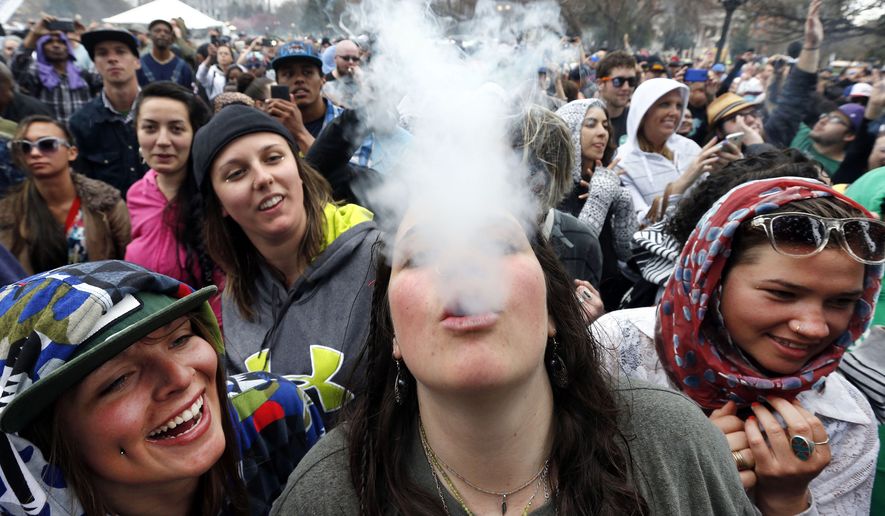Like gay marriage, climate change and a host of other issues before it, Hillary Clinton’s painfully slow evolution on marijuana legalization has again left the Democratic presidential nominee behind the curve in her own party — and her position represents a squandered opportunity to potentially win over millennials.
Polls have shown that about two-thirds of Democratic voters support legalizing pot, and the party, largely due to Sen. Bernard Sanders bringing the issue to prominence in his White House bid, called for a pathway to legalization in its platform last summer.
But Mrs. Clinton, her party’s standard-bearer in this presidential race, remains miles behind. While she supports rescheduling marijuana to facilitate more research on the drug’s medical benefits, the former first lady hasn’t embraced legalization. She has vowed, however, to take a hands-off approach to states such as Colorado and Washington that have fully legalized pot.
For the traditionally moderate Mrs. Clinton, the middle-of-the-road position may not be a surprising one. But for the new, supposedly more progressive Mrs. Clinton, marijuana is yet another example of her failure to take a stand at the cutting edge of a liberal issue.
What’s more, she’s ignored clear political benefits that could follow such a stand.
Mrs. Clinton has struggled to generate enthusiasm among the progressive millennial crowd that lined up behind Mr. Sanders in the party primary, and a recent Pew Research Center poll shows that nearly 80 percent of millennial Democrats — and even two-thirds of millennial Republicans — support marijuana legalization.
By contrast, Mrs. Clinton is far less popular among millennials. A Quinnipiac poll released earlier this month found just 31 percent of voters under 35 say they support Mrs. Clinton for president.
“It seems her biggest problem is millennials, and that group is strongly in favor of legalization. I believe she could be much more forward on this issue,” said Nevada state Sen. Tick Segerblom, an outspoken advocate for marijuana legalization and a Sanders delegate at last summer’s Democratic convention. “The big thing is millennials. They’re sitting on their hands saying, ’What difference does it make [who I vote for]?’ If you have someone who can articulate an issue that they can see makes a differences in their lives, and shows the candidates are in tune with where the country is going, that helps with their turnout, their enthusiasm.”
At least nine states — including key battleground areas such as Arizona and Nevada — have marijuana initiatives on the ballot Nov. 8, meaning voters who care about the issue may be especially motivated to turn out to vote.
Despite that, neither major party candidate has zeroed in on marijuana in their respective campaign. Mrs. Clinton’s opponent, Republican Donald Trump, hasn’t articulated a clear position with respect to federal legalization, though he has indicated he supports access to medical marijuana and believes states should be allowed to set their own policies.
Libertarian candidate Gary Johnson and Green Party candidate Jill Stein both support the legalization of marijuana.
Mrs. Clinton last month did say she’s in favor of rescheduling the drug. The Drug Enforcement Administration in August rejected a petition that would’ve removed marijuana from the Schedule 1 list, which puts it alongside heroin and other more dangerous substances.
Mrs. Clinton has vowed to make marijuana a Schedule II drug, which would mean the federal government recognizes pot’s medical uses and also would make it easier to conduct research on its potential benefits.
“We should make it easier to study marijuana so that we can better understand its potential benefits, as well as its side effects,” Clinton senior policy adviser Maya Harris said in a statement last month.
More broadly, marijuana advocates say Mrs. Clinton has taken the safe route with respect to her position. Despite growing support for legalization, the issue hasn’t gained real traction on Capitol Hill, and the former first lady is hardly the only politician out of step with public opinion, according to Paul Armentano, deputy director of the National Organization for the Reform of Marijuana Laws.
“Hillary Clinton is in good company,” he said, adding that a presidential candidate coming out in favor of legalization could have a profound impact.
“At a minimum, you would see lawmakers in their party mimic or parrot that position and use some of their political clout in favor of legislation to make that a reality,” Mr. Armentano said.
As for the Democratic Party itself, pressure from Mr. Sanders — and his delegates, such as Mr. Segerblom — ensured that marijuana reform made its way into the party platform.
“Because of conflicting laws concerning marijuana, both on the federal and state levels, we encourage the federal government to remove marijuana from its list as a Class 1 Federal Controlled Substance, providing a reasoned pathway for future legalization,” reads an amendment to the party platform, adopted before the Democratic convention in July.
• Ben Wolfgang can be reached at bwolfgang@washingtontimes.com.




Please read our comment policy before commenting.